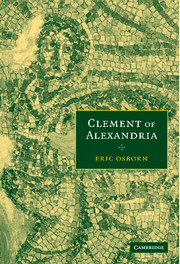Book contents
- Frontmatter
- Contents
- Preface
- List of abbreviations
- 1 Life and works
- PART I DIVINE PLAN/ECONOMY
- PART II DIVINE RECIPROCITY
- 5 God beyond God and God within God: The known centre of the unknown God
- 6 God beside God: the ellipse
- PART III FAITH AND SALVATION
- Conclusion
- Appendix: Irenaeus and Clement
- Select Bibliography
- Subject index
- Citations from Clement
- Citations from the Bible
- Citations from ancient authors
5 - God beyond God and God within God: The known centre of the unknown God
Published online by Cambridge University Press: 06 July 2010
- Frontmatter
- Contents
- Preface
- List of abbreviations
- 1 Life and works
- PART I DIVINE PLAN/ECONOMY
- PART II DIVINE RECIPROCITY
- 5 God beyond God and God within God: The known centre of the unknown God
- 6 God beside God: the ellipse
- PART III FAITH AND SALVATION
- Conclusion
- Appendix: Irenaeus and Clement
- Select Bibliography
- Subject index
- Citations from Clement
- Citations from the Bible
- Citations from ancient authors
Summary
Clement's work, which declares the gospel to the Greeks, includes a statement of Christian belief in one God, father and son. He finds, in the scriptural account of God and logos, problems of coherence. He turns to philosophy for illumination and commends his composite account as prior and superior to philosophy. He is at once exegete and apologist, using philosophy to elucidate and promote his biblical theology. Exegesis should be added to the other uses of Plato which have been found in Clement: propaganda for Christianity, defence of the Christian position, attack on heretics, comfort in face of martyrdom and the ascent to knowledge.
Problems about one God were evident in the prologue to John: God the father is beyond knowledge (1:18). God the knowable only begotten is in the father (1:18). The word was with God and the word was God (1:1). In eighteen of the most influential verses of the New Testament we have God beyond, within and beside God.
GOD BEYOND GOD, GOD WITHIN GOD, GOD BESIDE GOD
In paed 1.8.71.1, Clement rounds off a discussion of the goodness and justice of God. His final proof of God's goodness and justice is that God is good, God is one, God is just in the balanced relation between father and son. He quotes Jn 17:21–23, which includes the prayer that ‘they all may be one as you father are in me and I in you’. God is within God and God is beside God.
- Type
- Chapter
- Information
- Clement of Alexandria , pp. 111 - 131Publisher: Cambridge University PressPrint publication year: 2005



